- Home
- Ralph Peters
Cain at Gettysburg Page 5
Cain at Gettysburg Read online
Page 5
But just as the artilleryman had flicked the stub of his cigar into the mud and started off, Meade called, “Hunt?”
“General Meade?”
“When you cross Pipe Creek, see what you think of it as a defensive position. For the entire army, I mean. It looks all well and good on the map, and I’ve got Warren inspecting the length of it, but I’d appreciate your view on the subject. An old gunner’s opinion.”
Hunt saluted, a bit carelessly, and moved for his horse. He wasn’t careless when he placed his batteries, though. If Hunt blessed a position, it would be a sound one.
The sun tore through. The ill-tempered weather went from bad to worse, humid as a swamp. But the road through the town had opened. Regiments from the Twelfth Corps began to stream past.
The men did not cheer him. He didn’t think they even recognized him. Anyway, some would have preferred to have Reynolds, others would have liked McClellan back. Even Hooker still had partisans in the ranks.
Well, they didn’t have to love him. They just had to fight.
THREE
June 29, Evening
“Your soldiers certainly do seem full of fight,” Arthur Fremantle, captain and lieutenant colonel of Her Majesty’s Coldstream Guards, announced to the gathered officers. Pleased with himself, as always, he nodded under the lantern’s light. “Fine chaps, if a bit wild.”
Longstreet understood what the Englishman meant: The men of the Army of Northern Virginia were undisciplined and ragged. Impressive specimens in their way, but not to be measured against Her Majesty’s finest. Fremantle didn’t understand that there were forms of discipline that had nothing to do with parades.
“They’ll fight,” Longstreet agreed. He balanced his plate of stew on one knee to reach into his boot and scratch his leg. He hoped he hadn’t picked up poison ivy again. Or the camp itch.
“Yes, sir, fight they will,” Tom Goree put in. “Take a right pleasure in it, some of them. All’s we can do to stop them from gutting, cooking, and eating the Yankees they knock down.”
Goree had attached himself to Longstreet during the journey from Texas to Richmond at the outset of the war. He looked like a cleaned-up Comanche. A fine example of a Texas gentleman, Goree was fit to be trusted with a lady’s honor, but not with a sharp knife. Give a Texan a knife, Longstreet thought, and he can’t help using it on something.
“In all seriousness, Lieutenant Goree, one finds their morale remarkable,” Fremantle continued. “All in all.”
“Haven’t et so good in all their lives,” Goree explained. “They weren’t so pleased with things last winter. Were they, Moxley?”
“Wasn’t all that pleased myself,” Moxley Sorrel said. “Any more of that stew, John?”
“Jupiter’s saving a little for our European friends,” Fairfax told him. “If they haven’t gotten themselves bushwhacked by some Pennsylvania Hausfrau.”
“All right,” Sorrel told him. “I know you’d be mortified, were guests to judge a Fairfax inhospitable. Next time, though, tell that darkey of yours to buy an extra hen wherever he steals them.”
Longstreet focused on his plate. He wasn’t in a talking mood, not even with men he liked. Lee was on his mind, not some bothersome Englishman. He had not been able to get the old man to pledge to let the Federals attack. Longstreet knew Lee well enough to sense what he kept inside, and what Lee held back worried him. The old man loved to go right at his enemies, to tear into them and have done with it. The restraint of Fredericksburg had been a fluke, a matter of numbers so lopsided and a defensive position so tactically immaculate—along with a fool for an opponent—that Lee had been obliged to wait for the Federals to come at him. And that had been the right thing to do. It almost always was now. The killing power of massed artillery and rifled weapons was hurrying the age of the bold charge to an end. A fool could see it. And if your enemy would not oblige by attacking you, then you went around him, unhinged his position, and forced his hand. It wasn’t an age of war, but one of slaughter.
Longstreet also had begun to see that, for all Lee’s protestations to the contrary, the old man really didn’t want advice. Not from him. Nor from anyone else. Lee wanted his views confirmed. Unlike Jackson, with his mad eyes and his Bible, the old man was not immune to vanity. Behind that beautiful gentleman’s armor, Lee was as human as any man. And very much alone in the midst of his army. He didn’t value Longstreet’s suggestions about the campaign, but needed someone to talk to, a set of ears.
“Am I mistaken,” Fremantle asked, “or is there rather a divide between this headquarters and General Lee’s?”
Longstreet looked up sharply. How had the man sensed that?
Fremantle hadn’t sensed anything. He’d just noticed the obvious. “I mean to say,” the Englishman continued, “that it rather strikes one how General Lee surrounds himself with Virginians. While you, General Longstreet, gather in officers from the other states. Cavaliers and Roundheads, would you say?”
“Fairfax over there is a Virginian,” Longstreet said. “And single-handedly responsible for providing proper vittles to this headquarters. We always keep a tame Virginian around to rally our eats.” He wiped his beard. “And to see to our table manners.”
“Even when there’s no table,” Sorrel said, joining the merriment. “John’s straggling on us, he forgot the napkins again tonight.”
“Colonel Fremantle may have something of a point, though,” Fairfax suggested, “about the Roundhead business.” Fairfax was ever the man to ease another’s conversational blunder. “After all, my family aligned with Parliament until the regicide.” He reweighed his proposition, then added, “Of course, I’d tend toward putting the Roundhead label on the Federals, I think. They certainly have the self-righteousness … and the deplorable sobriety. I don’t think anyone here’s guilty of the latter.” He smiled. Fairfax was a master of smiles. “Anyway, Colonel Fremantle, not all of my fellow Virginians are shining Cavaliers.” His smile turned sly. “Except General Pickett, of course. He’s one Cavalier who shines himself three times a day.”
Longstreet guffawed. “Poor George. Best leave him alone, John. Given that he isn’t here to defend himself.” He laughed again, though.
Goree looked up, sniffing the air. “He ain’t? I swear I can smell his cologne water. Of course, he wears enough so’s you’d smell him the other side of the Mississippi.”
Longstreet felt compelled to explain to Fremantle that the joking was in good spirits, that all present had a high opinion—or a tolerably high one—of George Pickett. He didn’t want an outsider to misunderstand their ways.
But Fairfax spoke first. “Before we break out the elixir that soothes the soul, Colonel Fremantle, I must assure you that we’d tease George Pickett exactly the same way were he among us. He’s a fine soldier, and a brave man. Just a trifle lavish with the pomade.”
The oldest of the circle, Fairfax was more the staff’s master of household than a soldier. He, too, had attached himself to Longstreet early on, asking nothing in return. Longstreet enjoyed the man’s company, as he did that of all the men he had allowed to remain by his side.
“But don’t it seem odd,” Fremantle pressed on, deaf to the subject’s sensitivity, “that General Lee, in command of this rather … geographically complex army … surrounds himself exclusively with Virginians?”
“I’m not a Virginian,” Longstreet said.
“Yes!” Fremantle pounced. “Exactly so, sir! And you’re over here, while General Lee dines across the road with his staff.” Belatedly, he picked up the undercurrent. “I say, have I raised an indelicate subject?”
He had indeed. There was great resentment in the army about the preferments given to Virginians. Longstreet was the odd man out. But it did not bear talking over with a foreigner.
Horsemen drew up in the shadows. Scheibert, the Prussian observer, and Ross, his Scotland-born Austrian counterpart, made their way through a squadron of moths maddened by the lantern. Lawley, the fellow from The
Times of London, trailed in after them. Most men had at least one quality to recommend them. The newspaperman didn’t.
“Find us any Yankees?” Goree asked.
“No,” Scheibert said, dusting off his uniform frock coat. “They are not showing themselves, the Unionists.” Dueling scars shone white on his browned cheek. “But I must say to you something about the people here. You must not judge Germans by their unfortunate example. They have fallen from the race and do not even speak properly.”
Ross, the Austrian officer, took matters more lightly than the Prussian. “Anyway, they haven’t a great deal to say. Except that they’re rather frightened of your ‘Louisiana Tigers.’”
The two European officers made an odd pair, evidently hating each other to the point of declaring war—or perhaps fighting a duel—yet doing everything but the most private things together. Longstreet figured that neither wanted to let the other out of his sight.
“Gentlemen,” Fairfax announced, “our menu this evening offers a dish affectionately known in this army as poulet militaire. Or chicken stew. Of which there may be a portion or so remaining, if you’d care to go see Jupiter.…”
Ross pinched one end of his perfect mustache. If the Prussian paraded dueling scars, Ross suggested that he had left a few slashes on Viennese hearts. “Oh, we’ve eaten, thank you. These Pennsylvanians may speak poorly”—he glanced at his Prussian colleague—“but they do cook well enough.” He rubbed his hands together, as if recalling a delectable romance. “We had quite a peasant feast, actually, ein echten Bauernschmaus.” His seductive smile widened. “No surprise that these Yankee Dutch girls are so fat, the way they tuck in. A fellow would rather fear one as a lover.”
Longstreet reached down to scratch his leg again. There were nights when the unwitting minstrel show that Scheibert and Ross performed entertained him. This was not such a night. There was too much on his mind, too many things remained unknown.
Why hadn’t they encountered Yankee cavalry? Surely Stuart hadn’t drawn off all of them with his antics. Brandy Station had been a revelation. The Federals were learning. It took two years to make a cavalryman, according to military lore. Now the boys in blue had had their two years.
Longstreet could not believe they weren’t out there, horsemen in the dark, closer than Lee believed.
Determined not to be relegated to a minor role, Fremantle edged closer. Since he wore only civilian clothes, the observers in their traveling-circus uniforms kept their distance. But he wasn’t the sort of Englishman to quit the field.
“Lieutenant Goree claims you spent some years in Texas, General. I myself entered the Confederacy through Texas, you know. Rather a swashbuckling place … one finds the people quite forthright.” The Englishman glanced at Goree. “But charming, of course.” He turned back to Longstreet. “How did you find it, sir?”
Texas. Ft. Bliss. The post had been well named. He and Louise had never been as happy anywhere else. Later on, Albuquerque had not been bad, even if shadowed by the coming war, but El Paso and Ft. Bliss had given them wondrous years. The summer days scorched, but gorgeous nights redeemed them. And no post he knew had rivaled the place for comradeship, even between the officers and senior enlisted men. Few in number, the wives of all ranks had shared in the post’s society, while the old Mexican families, with their public dignity and polished silver buckles, had opened their doors to everyone. He had not expected that, only a decade after a war had raised a foreign flag above them. There had been a storybook goodness to the place, a whispered magic, and it had softened him. He recalled one winter morning when he led out a patrol in the brilliant chill, with the sky overhead as clear as a maiden’s conscience. He had raised up his eyes to the mountains ahead, thinking that it was a strange thing to be so happy.
“I liked Texas all right,” he told Fremantle.
They had been so in love, despite a loss, and the world had been sweetly, safely routine, interrupted only by an occasional march into the wilderness to show a band of Comanches or straying Apaches that the U.S. Government took an interest in their behavior.
Then secession had come, with its confusions. His choice of sides had never been in doubt, but nothing was sweet or safe or routine any longer. In the war’s first winter, scarlet fever killed three of their children. Louise waited on the far side of a river of sorrow now, and he knew not how to bridge it or where he might ford it. On learning the children were ill, he had rushed to Richmond, only to sit at home with the curtains drawn, neither he nor his wife able to rise from their grief to attend the burial. So the little ones entered the winter-hard earth alone. He understood war and its savagery, but not the death, so senselessly, of his children.
In his bleakest hours, Longstreet saw God as a murderer.
* * *
Sergeant Blake watched the Bunyan twins straggle in. Night had preceded them, but the regiment’s camp lay just beyond the crest of the mountain their march had climbed and the sky overhead held a last hush-a-bye glow. If you knew a man well enough, you could make him out at a distance in such light.
The Bunyans were strange boys, oxlike and quiet, who kept close to one another. Blake had tolerated it when James, the twin with longer hair, fell out and his brother, John, abandoned the march to stay by him. Another time, with another man, Blake might not have been so kindly. But there was something about the Bunyans that didn’t bear interfering with.
It was odd, what knocked a man down. The 26th North Carolina had endured many a tougher march, and the regiment had been rested before this one. The heat was cruel, and the route wound uphill, but the distance was short compared to the efforts they had endured of late. And neither Bunyan had ever quit a march before. Yet, this time James had begun to fail early on, dropping at last by the roadside, to the jeers of passing comrades. Sometimes, a man was just weak and there was no reason.
The twins affected a manly jauntiness as they approached the embers of the cook-fire. They were good boys, ashamed of straggling.
“Lookee,” Cobb cawed, “it’s the Bunyan girls come calling!”
“Shut up, Cobb,” Art Peachum said.
Despite the attempted bravado, James still walked with a weakness the dark wouldn’t hide.
“Sit on down,” Blake told the twins. “There’s ham and beans.”
“Likker, too,” Cobb said. “Maybe Sergeant Blake will join you for a snort after your eats?” He cackled, ever pleased at another’s misery. “Oh, I done forgot. Sergeant Blake don’t let liquor pass his lips. I wonder why that is?”
“You can just shut up,” Peachum told him a second time.
Blake turned to Jack Ireton, sensed close by. “Corporal Ireton? Call out a detail and gather up canteens. Start with the Bunyans’ there. Fill them at the well up top.”
“If it ain’t drunk dry,” Ireton said. It was an observation, not a protest. The army had emptied a number of wells down to their muddy bottoms, much to the dismay of the local farmers.
“You all right, James Bunyan?” Blake asked.
“He’s all right now,” his brother answered for him. When the two boys came down from the hills and joined up, a wag had nicknamed them “Pilgrim” and “Progress,” but the labels had not stuck, except in memories. Blake, too, had been given a nickname. Besides the inevitable “Quaker.” For a brief time, he had been known behind his back as “Lost Lenore,” until the men agreed among themselves, without much talking, that it went beyond the bounds of fair amusement.
“I didn’t ask you,” Blake said to the private. “I asked James.”
“It was just a dizzy spell, weren’t nothing,” an unsteady voice reported across the thickening darkness. No one wanted light badly enough to restoke the cooking fire in the heat.
“Going to have to carry us smelling salts for these girls of ours,” Cobb announced.
This time, everyone ignored him.
The Bunyan twins were anything but girlish. Hulking—although not as tall or strong as Blake—they had defied thei
r father to come down from Hawk’s Hollow and put on gray coats. Old Charlie Bunyan and his elder boy, Reese, went off to join the Federals. Last time anyone back home had heard of them, they were riding with a bad lot in western Virginia. When newspaper folk wrote high laments about brother against brother, they didn’t know how rough things got in the hills. Blake didn’t doubt but that the Bunyans would kill their own kind, if the chance came. Kill, then mourn.
A jug of farmhouse whiskey made the rounds. No one passed it to Blake. They knew better. Cobb needled him briefly, but the other men let things be.
There was no fairness to any of it. Blake had become a sergeant not because he was too hard-raised to skedaddle at New Bern, but because he was the strongest man with the biggest fists in the company. And there was no sense to those endowments, since, after his grandparents sent him down from Virginia, most of the work he had done had been in Mr. Curran’s store, while each of the men gathered by him had fed themselves and their kin by working fields on which a low-country planter would not have wasted one nigger. They had toiled, while he, at most, shifted sacks of flour. Yet, he could have beaten any man in the company in a fight. It never had come to a test, but they all sensed it, these lean men with muscles of harness leather.
The camp conversation shifted toward home, as men compared the mountain on which they sprawled to the highlands they knew, insisting the resemblance was uncanny. But that was a lie, if one they yearned to believe. In Pennsylvania, even the mountains promised a fertility that would have been the envy of any bottomland farmer in North Carolina.
For his part, Blake had no wish to be back home. Not anymore. The store, which hard work and Mr. Curran’s age—and kindliness—had made half Blake’s when he was twenty-three, meant nothing now. He had labored toward a dream of respectability. But, thanks to one wretched, accidental meeting, that dream was dead.
Masked by the dark, Blake allowed the hard expression he kept up to twist into bitterness. The truth was that his dream had died before that. The men over whom he had charge had joined because they believed in something, even if they were not certain what it was. No slaveholders, they had come down from the glens as their ancestors had, as if at a war horn’s call. Men who sat so near him their smells had names—Tam McMinn, Hugh Gordon, and Pike Gray—had rallied to a cause they could not have explained had they been granted eternity to find words. And he, Thomas Fox Blake, had joined for a woman.

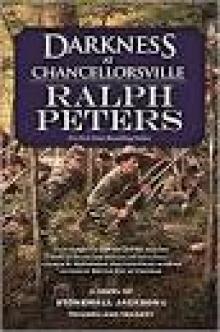 Darkness at Chancellorsville
Darkness at Chancellorsville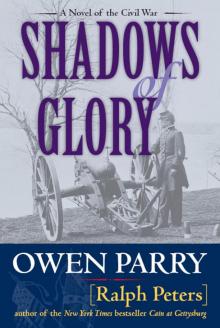 Shadows of Glory
Shadows of Glory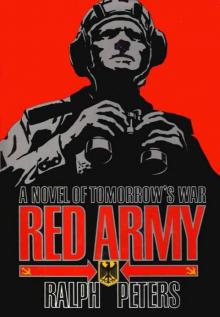 Red Army
Red Army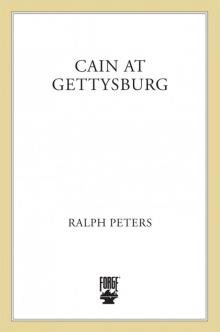 Cain at Gettysburg
Cain at Gettysburg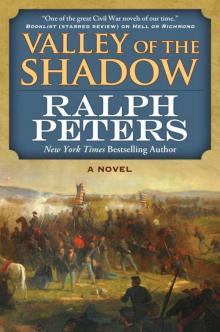 Valley of the Shadow: A Novel
Valley of the Shadow: A Novel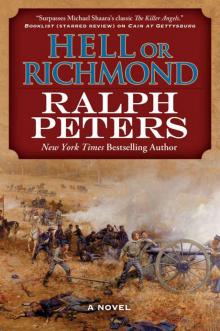 Hell or Richmond
Hell or Richmond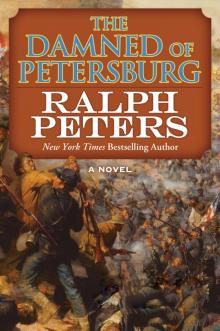 The Damned of Petersburg
The Damned of Petersburg The War After Armageddon
The War After Armageddon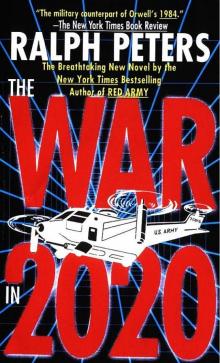 The War in 2020
The War in 2020